- Home
- Charles de Lint
Dreams Underfoot n-1 Page 5
Dreams Underfoot n-1 Read online
Page 5
Jilly shivered.
“Now I remember why I don’t like to read Christy’s stuff,” she said. “He can be so sweet on one page, and then on the next he’s taking you on a tour through an abattoir.”
“Just like life,” Bramley said.
“Wonderful. So what are you saying?”
“They’ll be wanting it back,” Bramley said.
Jilly woke some time after midnight with the Professor’s words ringing in her ears.
They’ll be wanting it back.
She glanced at the stone drum where it sat on a crate by the window of her Yoors Street loft in Foxville. From where she lay on her Murphy bed, the streetlights coming in the window wove a haloing effect around the stone artifact. The drum glimmered with magic—or at least with a potential for magic.
And there was something else in the air. A humming sound, like barely audible strains of music. The notes seemed disconnected, drifting randomly through the melody like dust motes dancing in a beam of sunlight, but there was still a melody present.
She sat up slowly. Pushing the quilt aside, she padded barefoot across the room. When she reached the drum, the change in perspective made the streetlight halo slide away; the drum’s magic fled. It was just an odd stone artifact once more. She ran her finger along the smoothed indentations that covered the sides of the artifact, but didn’t touch the top. It was still marvelous enough—a hollow stone, a mystery, a puzzle. But ...
She remembered the odd almostbut-notquite music she’d heard when she first woke, and cocked her ear, listening for it. Nothing.
Outside, a light drizzle had wet the pavement, making Yoors Street glisten and sparkle with its sheen.
She knelt down by the windowsill and leaned forward, looking out, feeling lonely. It’d be nice if Geordie were here, even if his brother did write those books that had the Professor so enamoured, but Geordie was out of town this week. Maybe she should get a cat or a dog—just something to keep her company when she got into one of these odd funks—but the problem with pets was that they tied you down. No more gallivanting about whenever and wherever you pleased. Not when the cat needed to be fed. Or the dog had to be walked.
Sighing, she started to turn from the window, then paused. A flicker of uneasiness stole up her spine as she looked more closely at what had caught her attention—there, across the street. Time dissolved into a pattern as random as that faint music she’d heard when she woke earlier. Minutes and seconds marched sideways; the hands of the old Coors clock on her wall stood still.
A figure leaned against the wall, there, just to one side of the display window of the Chinese groceteria across the street, a figure as much a patchwork as the disarray in the shop’s window. Pumpkin head under a widebrimmed hat. A larger pumpkin for the body with what looked like straw spilling out from between the buttons of its toosmall jacket. Arms and legs as thin as broom handles. A wide slit for a mouth; eyes like the sharp yellow slits of a jacko’-lantern with a candle burning inside.
A Halloween creature. And not alone.
There was another, there, in the mouth of that alleyway. A third clinging to the wall of the brownstone beside the groceteria. Four more on the rooftop directly across the street—pumpkinheads lined up along the parapet, all in a row.
Skookin, Jilly thought and she shivered with fear, remembering Christy Riddell’s story.
Damn Christy for tracking the story down, and damn the Professor for reminding her ofit. And damn the job that had sent her down into Old City in the first place to take photos for the background of the painting she was currently working on.
Because there shouldn’t be any such thing as skookin. Because ...
She blinked, then rubbed her eyes. Her gaze darted left and right, up and down, raking the street and the faces of buildings across the way.
Nothing.
No pumpkin goblins watching her loft.
The sound of her clock ticking the seconds away was suddenly loud in her ears. A taxi went by on the street below, spraying a fine sheet of water from its wheels. She waited for it to pass, then studied the street again.
There were no skookin.
Ofcourse there wouldn’t be, she told herself, trying to laugh at how she’d let her imagination run away with itself, but she couldn’t muster up even the first hint ofa smile. She looked at the drum, reached a hand towards it, then let her hand fall to her lap, the drum untouched. She turned her attention back to the street, watching it for long moments before she finally had to accept that there was nothing out there, that she had only peopled it with her own night fears.
Pushing herself up from the sill, she returned to bed and lay down again. The palm of her right hand itched a little, right where she’d managed to poke herself on a small nail or wood sliver while she was down in Old City. She scratched her hand and stared up at the ceiling, trying to go to sleep, but not expecting to have much luck. Surprisingly, she drifted off in moments.
And dreamed.
Of Bramley’s study. Except the Professor wasn’t ensconced behind his desk as usual. Instead, he was setting out a serving of tea for her and Goon, who had taken the Professor’s place behind the tottering stacks of papers and books on the desk.
“Skookin,” Goon said, when the Professor had finished serving them their tea and left the room.
“They’ve never existed, of course.”
Jilly nodded in agreement.
“Though in some ways,” Goon went on, “they’ve always existed. In here—” He tapped his temple with a gnarly, very skookinlike finger. “In our imaginations.”
“But—” Jilly began, wanting to tell him how she’d seen skookin, right out there on her very own street tonight, but Goon wasn’t finished.
“And that’s what makes them real,” he said.
His head suddenly looked very much like a pumpkin. He leaned forward, eyes glittering as though a candle was burning there inside his head, flickering in the wind.
“And if they’re real,” he said.
His voice wound down alarmingly, as though it came from the spiraling groove of a spokenword album that someone had slowed by dragging their finger along on the vinyl.
“Then. You’re. In. A. Lot. Of—”
Jilly awoke with a start to find herself backed up against the frame of the head of her bed, her hands worrying and tangling her quilt into knots.
Just a dream. Cast off thoughts, tossed up by her subconscious. Nothing to worry about. Except ...
She could finish the dreamGoon’s statement.
If they were real ...
Never mind being in trouble. If they were real, then she was doomed.
She didn’t get any more sleep that night, and first thing the next morning, she went looking for help.
“Skookin,” Meran said, trying hard not to laugh.
“Oh, I know what it sounds like,” Jilly said, “but what can you do? Christy’s books are Bramley’s pet blind spot and if you listen to him long enough, he’ll have you believing anything.”
“But skookin,” Meran repeated and this time she did giggle. Jilly couldn’t help but laugh with her.
Everything felt very different in the morning light—especially when she had someone to talk it over with whose head wasn’t filled with Christy’s stories.
They were sitting in Kathryn’s Cafe—an hour or so after Jilly had found Meran Kelledy down by the Lake, sitting on the Pier and watching the early morning joggers run across the sand: yuppies from downtown, healthconscious gentry from the Beaches.
It was a short walk up Battersfield Road to where Kathryn’s was nestled in the heart of Lower Crowsea. Like the area itself, with its narrow streets and old stone buildings, the cafe had an old world feel about it—from the dark wood paneling and handcarved chair backs to the small round tables, with checkered tablecloths, fat glass condiment containers and strawwrapped wine bottles used as candleholders. The music piped in over the house sound system was mostly along the lines of Telemann and Vi
valdi, Kitaro and old Bob James albums. The waitresses wore creamcolored pinafores over flowerprint dresses.
But if the atmosphere was old world, the clientele were definitely contemporary. Situated so close to Butler U., Kathryn’s had been a favorite haunt of the university’s students since it first opened its doors in the midsixties as a coffee house. Though much had changed from those early days, there was still music played on its small stage on Friday and Saturday nights, as well as poetry recitations on Wednesdays and Sunday morning storytelling sessions.
Jilly and Meran sat by a window, coffee and homemade banana muffins set out on the table in front of them.
“Whatever were you doing down there anyway?” Meran asked. “It’s not exactly the safest place to be wandering about.”
Jilly nodded. The skells in Old City weren’t all thin and wasted. Some were big and meanlooking, capable of anything—not really the sort of people Jilly should be around, because if something went wrong ... well, she was the kind of woman for whom the word petite had been coined. She was small and slender—her tiny size only accentuated by the oversized clothing she tended to wear. Her brown hair was a thick tangle, her eyes the electric blue of sapphires. She was too pretty and too small to be wandering about in places like Old City on her own.
“You know the band, No Nuns Here?” Jilly asked.
Meran nodded.
“I’m doing the cover painting for their first album,” Jilly explained. “They wanted something moody for the background—sort of like the Tombs, but darker and grimmer—and I thought Old City would be the perfect place to get some reference shots.”
“But to go there on your own ...”
Jilly just shrugged. She was known to wander anywhere and everywhere, at any time of the night or day, camera or sketchbook in hand, often both.
Meran shook her head. Like most of Jilly’s friends, she’d long since given up trying to point out the dangers of carrying on the way Jilly did.
“So you found this drum,” she said.
Jilly nodded. She looked down at the little scab on the palm of her hand. It itched like crazy, but she was determined not to open it again by scratching it.
“And now you want to ... ?”
Jilly looked up. “Take it back. Only I’m scared to go there on my own. I thought maybe Cerin would come with me—for moral support, you know?”
“He’s out of town,” Meran said.
Meran and her husband made up the two halves of the Kelledys, a local traditional music duo that played coffee houses, festivals and colleges from one coast to the other. For years now, however, Newford had been their home base.
“He’s teaching another of those harp workshops,” Meran added. Jilly did her best to hide her disappointment.
What she’d told Meran about “moral support” was only partly the reason she’d wanted their help because, more so than either Riddell’s stories or Bramley’s askew theories, the Kelledys were the closest thing to real magic that she could think of in Newford. There was an otherworldly air about the two of them that went beyond the glamour that seemed to always gather around people who became successful in their creative endeavors.
It wasn’t something Jilly could put her finger on. It wasn’t as though they went on and on about this sort of thing at the drop of a hat the way that Bramley did. Nor that they were responsible for anything more mysterious than the enchantment they awoke on stage when they were playing their instruments. It was just there. Something that gave the impression that they were aware of what lay beyond the here and now. That they could see things others couldn’t; knew things that remained secret to anyone else.
Nobody even knew where they had come from; they’d just arrived in Newford a few years ago, speaking with accents that had rapidly vanished, and here they’d pretty well stayed ever since. Jilly had always privately supposed that if there was a place called Faerie, then that was from where they’d come, so when she woke up this morning, deciding she needed magical help, she’d gone looking for one or the other and found Meran. But now ...
“Oh,” she said.
Meran smiled.
“But that doesn’t mean I can’t try to help,” she said.
Jilly sighed. Help with what? she had to ask herself. The more she thought about it, the sillier it all seemed. Skookin. Right. Maybe they held debating contests with Riddell’s mutant rats.
“I think maybe I’m nuts,” she said finally. “I mean, goblins living under the city ... ?”
“I believe in the little people,” Meran said. “We called them bodachs where I come from.”
Jilly just looked at her.
“But you laughed when I talked about them,” she said finally. “I know—and I shouldn’t have. It’s just that whenever I hear that name that Christy’s given them, I can’t help myself. It’s so silly.”
“What I saw last night didn’t feel silly,” Jilly said.
If she’d actually seen anything. By this point—even with Meran’s apparent belief—she wasn’t sure what to think anymore.
“No,” Meran said. “I suppose not. But—you’re taking the drum back, so why are you so nervous?”
“The man in Christy’s story returned the apple he stole,” Jilly said, “and you know what happened to him ....”
“That’s true,” Meran said, frowning.
“I thought maybe Cerin could ...” Jilly’s voice trailed off.
A small smile touched Meran’s lips. “Could do what?”
“Well, this is going to sound even sillier,” Jilly admitted, “but I’ve always pictured him as sort of a wizard type.”
Meran laughed. “He’d love to hear that. And what about me? Have I acquired wizardly status as well?”
“Not exactly. You always struck me as being an earth spirit—like you stepped out of an oak tree or something.” Jilly blushed, feeling as though she was making even more of a fool of herself than ever, but now that she’d started, she felt she had to finish. “It’s sort of like he learned magic, while you just are magic.”
She glanced at her companion, looking for laughter, but Meran was regarding her gravely. And she did look like a dryad, Jilly thought, what with the green streaks in the long, nutbrown ringlets of her hair and her fey sort of PreRaphaelite beauty. Her eyes seemed to provide their own light, rather than take it in.
“Maybe I did step out of a tree one day,” Meran said.
Jilly could feel her mouth forming a surprised “0,” but then Meran laughed again.
“But probably I didn’t,” she said. Before Jilly could ask her about that “probably,” Meran went on:
“We’ll need some sort of protection against them.”
Jilly made her mind shift gears, from Meran’s origins to the problem at hand.
“Like holy water or a cross?” she asked.
Her head filled with the plots of a hundred bad horror films, each of them clamoring for attention.
“No,” Meran said. “Religious artifacts and trappings require faith—a belief in their potency that the skookin undoubtedly don’t have. The only thing I know for certain that they can’t abide is the truth.”
“The truth?”
Meran nodded. “Tell them the truth—even it’s only historical facts and trivia—and they’ll shun you as though you were carrying a plague.”
“But what about after?” Jilly said. “After we’ve delivered the drum and they come looking for me?
Do I have to walk around carrying a cassette machine spouting dates and facts for the rest of my life?”
“I hope not.”
“But—”
“Patience,” Meran replied. “Let me think about it for awhile.” Jilly sighed. She regarded her companion curiously as Meran took a sip of her coffee.
“You really believe in this stuff, don’t you?” she said finally. “Don’t you?”
Jilly had to think about that for a moment.
“Last night I was scared,” she said, “and I’m returning the
drum because I’d rather be safe than sorry, but I’m still not sure.”
Meran nodded understandingly, but, “Your coffee’s getting cold,” was all she had to say.
Meran let Jilly stay with her that night in the rambling old house where she and Cerin lived. Straddling the border between Lower Crowsea and Chinatown, it was a tall, gabled building surrounded by giant oak trees. There was a rounded tower in the front to the right of a long screenenclosed porch, stables around the back, and a garden along the west side of the house that seemed to have been plucked straight from a postcard of the English countryside.
Jilly loved this area. The Kelledys’ house was the easternmost of the stately estates that stood, row on row, along McKennitt Street, between Lee and Yoors. Whenever Jilly walked along this part of McKennitt, late at night when the streetcars were tucked away in their downtown station and there was next to no other traffic, she found it easy to imagine that the years had wound back to a bygone age when time moved at a different pace, when Newford’s streets were cobblestoned and the vehicles that traversed them were horsedrawn, rather than horsepowered.
“You’ll wear a hole in the glass if you keep staring through it so intently.”
Jilly started. She turned long enough to acknowledge her hostess’s presence, then her gaze was dragged back to the window, to the shadows cast by the oaks as twilight stretched them across the lawn, to the long low wall that bordered the lawn, to the street beyond.
Still no skookin. Did that mean they didn’t exist, or that they hadn’t come out yet? Or maybe they just hadn’t tracked her here to the Kelledys’ house.
She started again as Meran laid a hand on her shoulder and gently turned her from the window.
“Who knows what you’ll call to us, staring so,” Meran said.
Her voice held the same light tone as it had when she’d made her earlier comment, but this time a certain sense of caution lay behind the words.

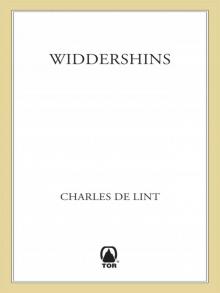 Widdershins
Widdershins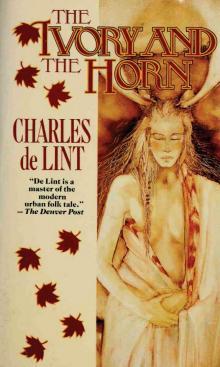 The Ivory and the Horn
The Ivory and the Horn Yarrow
Yarrow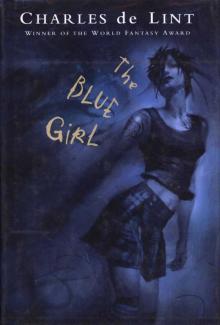 The Blue Girl
The Blue Girl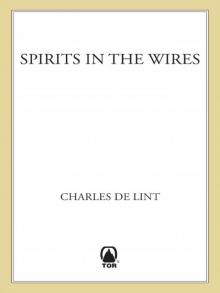 Spirits in the Wires
Spirits in the Wires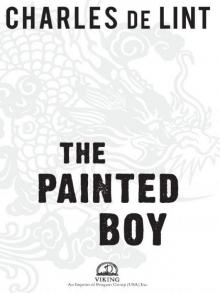 The Painted Boy
The Painted Boy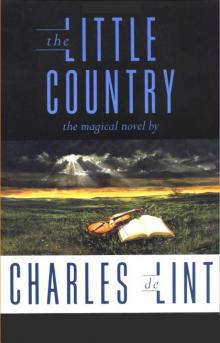 The Little Country
The Little Country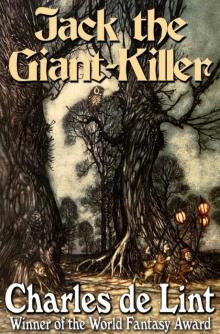 Jack of Kinrowan: Jack the Giant-Killer / Drink Down the Moon
Jack of Kinrowan: Jack the Giant-Killer / Drink Down the Moon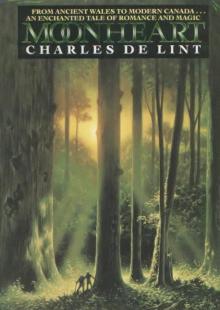 Moonheart
Moonheart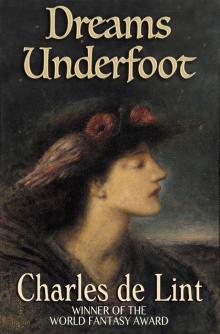 Dreams Underfoot
Dreams Underfoot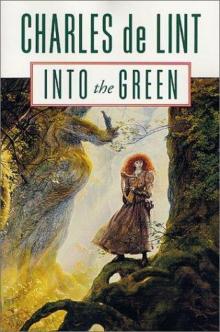 Into the Green
Into the Green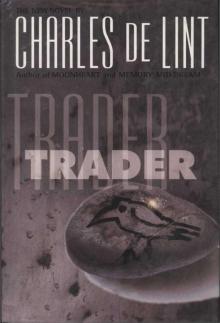 Trader
Trader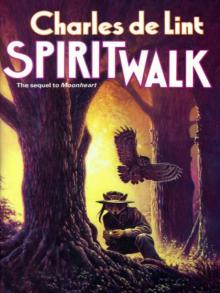 Spiritwalk
Spiritwalk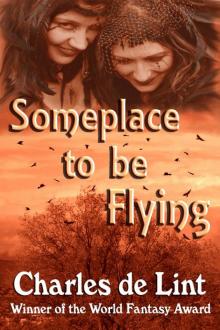 Someplace to Be Flying
Someplace to Be Flying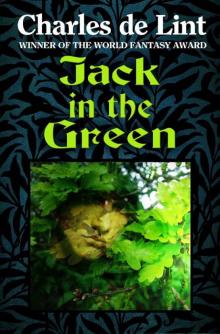 Jack in the Green
Jack in the Green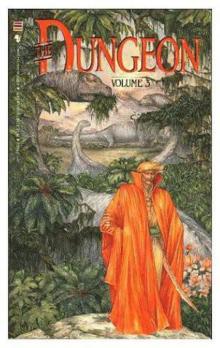 The Valley of Thunder
The Valley of Thunder Out of This World
Out of This World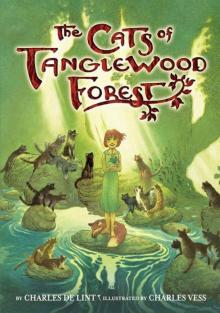 The Cats of Tanglewood Forest
The Cats of Tanglewood Forest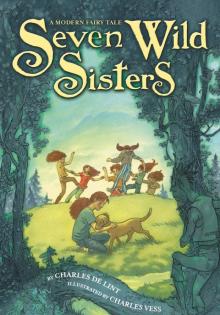 Seven Wild Sisters
Seven Wild Sisters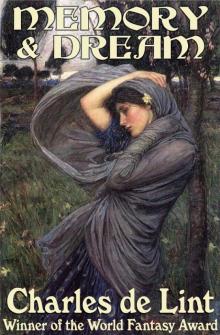 Memory and Dream
Memory and Dream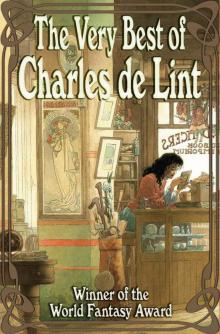 The Very Best of Charles De Lint
The Very Best of Charles De Lint Under My Skin
Under My Skin Forests of the Heart
Forests of the Heart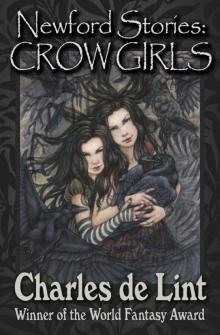 The Newford Stories
The Newford Stories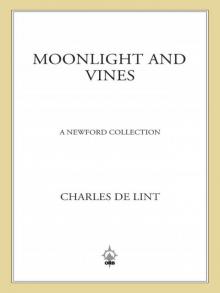 Moonlight and Vines
Moonlight and Vines Angel of Darkness
Angel of Darkness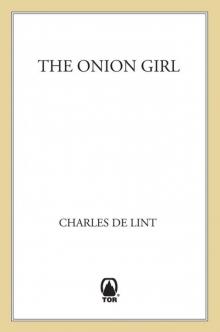 The Onion Girl
The Onion Girl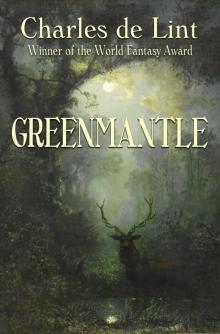 Greenmantle
Greenmantle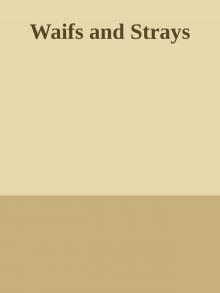 Waifs And Strays
Waifs And Strays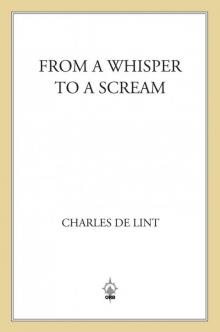 From a Whisper to a Scream
From a Whisper to a Scream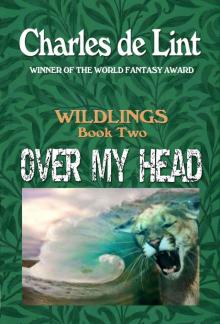 Over My Head
Over My Head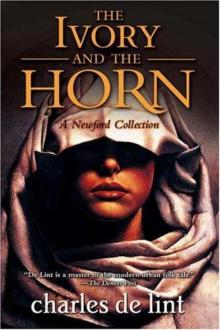 The Ivory and the Horn n-6
The Ivory and the Horn n-6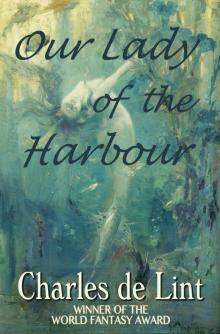 Our Lady of the Harbour
Our Lady of the Harbour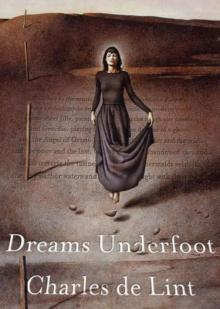 Dreams Underfoot n-1
Dreams Underfoot n-1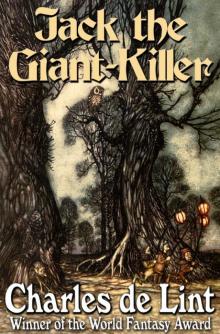 Jack the Giant-Killer (Jack of Kinrowan Book 1)
Jack the Giant-Killer (Jack of Kinrowan Book 1)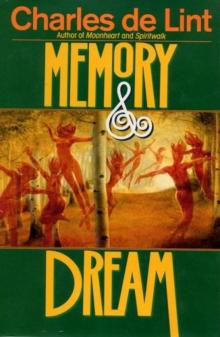 Memory and Dream n-5
Memory and Dream n-5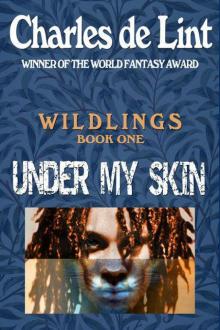 Under My Skin (Wildlings)
Under My Skin (Wildlings)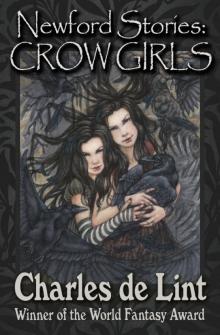 Newford Stories
Newford Stories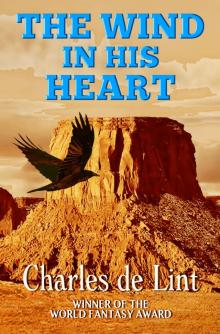 The Wind in His Heart
The Wind in His Heart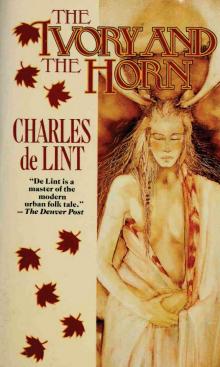 Ivory and the Horn
Ivory and the Horn